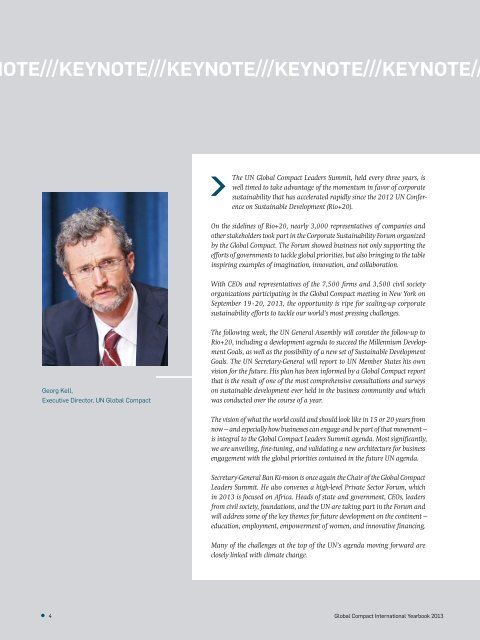Global Compact International Yearbook Ausgabe 2013
The UN Global Compact is the world’s leading platform for corporate sustainability. In describing the future aims of the Global Compact, UN Secretary-General H.E. Ban Ki-moon says: “A growing number of business in all regions recognize the importance of reflecting environmental, social, and economic considerations in their operations and strategies. Now the challenge is to move from incremental process to transformation – in society and markets alike.” The new 2013 edition of the Global Compact International Yearbook offers proactive and in-depth information on key sustainability issues and focuses on recent developments of stakeholder management such as managing corporate legitimacy, for example. Concomitant to this is the call for a more holistic reporting of companies’ financial and nonfinancial performance, which is expressed in the idea of integrated reporting. Furthermore, this edition highlights the connection between the sustainable development of African societies and the ways of managing and governing their natural wealth. The newest developments concerning the move toward a low-carbon economy are shown in the chapter on climate change, which emphasizes the importance of reducing the output of greenhouse gases. Corresponding to the idea of mutual learning, the Global Compact International Yearbook includes 43 good practices of corporate participants that showcase different approaches to the implementation of the Ten Principles of the Global Compact. The Global Compact International Yearbook is a product of the macondo media group and United Nation Publications in cooperation with the Global Compact Office in support of the UN Global Compact and the global advancement of corporate sustainability. It contains 196 pages.
The UN Global Compact is the world’s leading platform for corporate sustainability. In describing the future aims of the Global Compact, UN Secretary-General H.E. Ban Ki-moon says: “A growing number of business in all regions recognize the importance of reflecting environmental, social, and economic considerations in their operations and strategies. Now the challenge is to move from incremental process to transformation – in society and markets alike.”
The new 2013 edition of the Global Compact International Yearbook offers proactive and in-depth information on key sustainability issues and focuses on recent developments of stakeholder management such as managing corporate legitimacy, for example. Concomitant to this is the call for a more holistic reporting of companies’ financial and nonfinancial performance, which is expressed in the idea of integrated reporting. Furthermore, this edition highlights the connection between the sustainable development of African societies and the ways of managing and governing their natural wealth. The newest developments concerning the move toward a low-carbon economy are shown in the chapter on climate change, which emphasizes the importance of reducing the output of greenhouse gases.
Corresponding to the idea of mutual learning, the Global Compact International Yearbook includes 43 good practices of corporate participants that showcase different approaches to the implementation of the Ten Principles of the Global Compact. The Global Compact International Yearbook is a product of the macondo media group and United Nation Publications in cooperation with the Global Compact Office in support of the UN Global Compact and the global advancement of corporate sustainability. It contains 196 pages.
You also want an ePaper? Increase the reach of your titles
YUMPU automatically turns print PDFs into web optimized ePapers that Google loves.
ote///Keynote///Keynote///Keynote///Keynote//<br />
The UN <strong>Global</strong> <strong>Compact</strong> Leaders Summit, held every three years, is<br />
well timed to take advantage of the momentum in favor of corporate<br />
sustainability that has accelerated rapidly since the 2012 UN Conference<br />
on Sustainable Development (Rio+20).<br />
On the sidelines of Rio+20, nearly 3,000 representatives of companies and<br />
other stakeholders took part in the Corporate Sustainability Forum organized<br />
by the <strong>Global</strong> <strong>Compact</strong>. The Forum showed business not only supporting the<br />
efforts of governments to tackle global priorities, but also bringing to the table<br />
inspiring examples of imagination, innovation, and collaboration.<br />
With CEOs and representatives of the 7,500 firms and 3,500 civil society<br />
organizations participating in the <strong>Global</strong> <strong>Compact</strong> meeting in New York on<br />
September 19 - 20, <strong>2013</strong>, the opportunity is ripe for scaling-up corporate<br />
sustainability efforts to tackle our world’s most pressing challenges.<br />
Georg Kell,<br />
Executive Director, UN <strong>Global</strong> <strong>Compact</strong><br />
The following week, the UN General Assembly will consider the follow-up to<br />
Rio+20, including a development agenda to succeed the Millennium Development<br />
Goals, as well as the possibility of a new set of Sustainable Development<br />
Goals. The UN Secretary-General will report to UN Member States his own<br />
vision for the future. His plan has been informed by a <strong>Global</strong> <strong>Compact</strong> report<br />
that is the result of one of the most comprehensive consultations and surveys<br />
on sustainable development ever held in the business community and which<br />
was conducted over the course of a year.<br />
The vision of what the world could and should look like in 15 or 20 years from<br />
now – and especially how businesses can engage and be part of that movement –<br />
is integral to the <strong>Global</strong> <strong>Compact</strong> Leaders Summit agenda. Most significantly,<br />
we are unveiling, fine-tuning, and validating a new architecture for business<br />
engagement with the global priorities contained in the future UN agenda.<br />
Secretary-General Ban Ki-moon is once again the Chair of the <strong>Global</strong> <strong>Compact</strong><br />
Leaders Summit. He also convenes a high-level Private Sector Forum, which<br />
in <strong>2013</strong> is focused on Africa. Heads of state and government, CEOs, leaders<br />
from civil society, foundations, and the UN are taking part in the Forum and<br />
will address some of the key themes for future development on the continent –<br />
education, employment, empowerment of women, and innovative financing.<br />
Many of the challenges at the top of the UN’s agenda moving forward are<br />
closely linked with climate change.<br />
4<br />
<strong>Global</strong> <strong>Compact</strong> <strong>International</strong> <strong>Yearbook</strong> <strong>2013</strong>

















